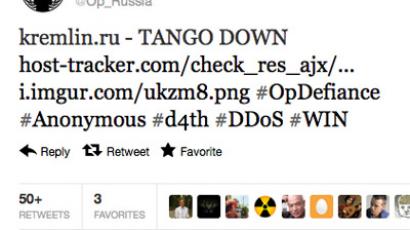FSB wants Russian internet communications to be recorded

Russia’s Communications Ministry, in cooperation with security services, is finalizing a directive obliging internet providers to record private internet communications.
However, unwilling to bear unanticipated expenses, internet
providers are citing constitutional freedoms.
According to Kommersant daily, the new directive has been in development for over six months, in close cooperation with the Federal Security Service (FSB).
The major innovation of the new directive is that it would require internet providers to record constantly the last 12 hours or more of traffic coming through their servers, starting from July 1, 2014. This would allow the FSB secret service to control phone numbers, IPs, register entries, e-mails of social networks users etc.
Kommersant Daily has obtained a letter from Russia’s communications giant, Vympelkom, to the Ministry of Communications and Mass Media. The letter signed by Aleksey Rokotyan, Vympelkom’s Director of analytical support and liaison with governmental bodies, maintains that the directive contradicts articles 23, 24 and 25 of the Russian constitution, which guarantee secrecy of communications and prevents collection and recording of private information, unless ruled otherwise by a court.
The letter also mentions the provider’s concern with the additional expenses it would have to bear if the directive comes into force.
Actually, all major providers are already closely cooperating with the FSB and have their servers connected to FSB’s web monitoring facilities. But recording terabytes of dataflow is an expensive activity requiring additional data storage installation; some minor providers would simply be unable to sustain this financially.
So far providers have had to connect their servers to FSB lines
at their own expense, Kommersant Daily reports.
According to another Kommersant’s source, Vympelkom estimates
that $100 million of additional investment will be needed to
comply with the upcoming law, whereas according to the same
source another Russian IT major, MTS, estimates its extra
expenses caused by the law will be a much less - 300 million
rubles (less than $10m).
So the question now is whether the government is ready to finance the undertaking from the budget, paying for millions of dollars’ worth of equipment needed.
Russia’s Ministry of Communications and Mass Media said that the new directive “principally adds nothing new to the work of internet providers”. Most of them have already been working with security authorities closely since 2008, when obligatory connection of servers’ dataflow to the FSB’s Operational-Investigative System was introduced.
The Ministry’s press-service stressed that the new directive only specifies the technical aspects of the FSB’s internet data use and does not circumvent the necessity of a court ruling to get access to private data.
“The system is not a threat to a law abiding citizen, it only brings additional security,” the Ministry says.
“Operators would only be obliged to install the necessary equipment and ensure FSB’s access to the data. Operators themselves would not have access to the data processed on that equipment, being performed in accordance with the law, within the framework of the operational-investigative activities,” the Ministry maintains.
Russian lawmakers gave an assurance that honest citizens have nothing to fear.
“If someone doesn’t know, as of today (internet) operators are actively and voluntarily cooperating with special services, because no company, I hope, no citizen is interested in concealing information that may lead to the identification of a perpetrator and bring him to responsibility [sic],” vice-speaker, Sergey Zheleznyak, told the RIA news agency. Mr Zheleznyak oversees information technologies in the Russia’s parliament. The MP also noted that the introduction of the new directive is prompted by the fast development of the IT sphere.
The Chairman of the Senate’s Defense and Security Committee, Viktor Ozerov, commented to RIA on the matter, saying that if the FSB is investigating terror acts and crimes threatening national security, he sees “nothing tragic” in special services having access to internet dataflow. The Senator pointed out that if police can, in certain cases, enter a private dwelling without a court’s ruling, why can’t special services have a right to access the servers of internet providers.
“We always talk about human rights when it comes to us personally, but when serious security matters emerge, people tend to blame special services for bad work,” the Senator added.
There is nothing wrong with controlling the internet as long as
the information is restricted for use strictly within the special
services, Russian MP Aleksandr Khinshtein commented on the news.
“If a person visits a normal, lawful website, what should he
be afraid or ashamed of?” Khinshtein said, stressing though
that there must be “certain controllability” of the
internet overseeing process.
The leader of the Fair Russia party, Sergey Mironov, has spoken against the directive, saying that if Kommersant’s information is correct, this is a direct violation of the Russian constitution.
At the same time, Mironov noted that he would like to get acquainted with the document personally, saying that “the publication, honestly speaking, looks strange and raises very big questions.”
Last week the Russian government also announced the preparation of a bill allowing the FSB to take measures against hackers who threaten the country’s information systems.
Kremlin regaining control over Russian internet
Russian lawmakers started preparing new legislation empowering the FSB with new powers, following President Vladimir Putin’s directive to ensure tighter national control over the Russian segment of the World Wide Web.
Speaking at an expanded session of the FSB counterintelligence service in February, President Putin declared that “nobody has a right to sow hatred and rock society and the country, thus jeopardizing the life, wellbeing and peace of millions of our citizens,” stressing that extremist and terrorist groups use the internet for disseminating their messages.
The Russian president urged the prevention of people, in particularly younger members of society from “being dragged into terrorist groups and militant gangs”.
“We should act resolutely to break up the different types of extremist structures, and thwart the attempts of extremists to use the capabilities of modern information technologies, Internet resources and social networks for their propaganda,” stipulated Vladimir Putin, demanding the development of a uniform system that will be able to “detect, prevent and repel” computer attacks against Russia's information resources “as promptly as possible”.
However, these “well-planned special operations” must be
implemented with “perfectly legal and judical
transparency,” said Putin back in February.














